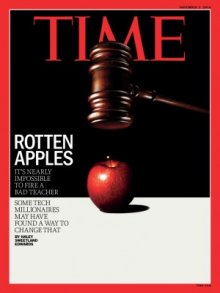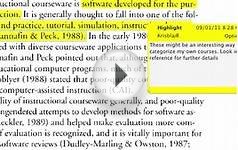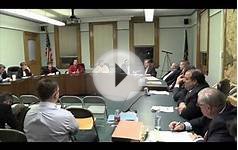 November 3 issue began getting heat about a week ago when the cover blared, “It’s nearly impossible to fire a bad teacher.” Union leaders and teacher bloggers ignited a backlash, which included an opinion piece by American Federation of Teachers President Randi Weingarten who wrote, “America’s teachers aren’t rotten apples . . . America’s teachers are national treasures, doing the most important job in our country—educating children for today’s democracy and tomorrow’s economy.”
November 3 issue began getting heat about a week ago when the cover blared, “It’s nearly impossible to fire a bad teacher.” Union leaders and teacher bloggers ignited a backlash, which included an opinion piece by American Federation of Teachers President Randi Weingarten who wrote, “America’s teachers aren’t rotten apples . . . America’s teachers are national treasures, doing the most important job in our country—educating children for today’s democracy and tomorrow’s economy.”
Like all professions, education, unfortunately, includes people who do not belong in the classroom. Sometimes it’s these individuals’ fault for going into teaching for the wrong reasons or because they misunderstand what good teachers do. Someone recently told me, “You must get really sleepy sitting at your desk all day.” He doesn’t get what I do.
Sometimes, it's our profession's fault from not defending and supporting promising teachers.
While I agree with the backlash against Time’s ill-founded cover, Haley Sweetland Edwards’s article reveals some truths about local and national education conversations.
1. Too many white non-educators care about education.
During a recent conversation with a white non-educator I asked what I’d thought for a long time: “When did white people start caring so much about public education?” I got a good answer.
White non-educators started caring about public education, this person told me: in 1987 (during my sophomore year at a Southwest side Chicago public high school) when Secretary of Education William Bennett called Chicago Public Schools the worst in the country. Then, people paid attention to the 1983 report A Nation at Risk, published under Reagan's administration. Then, governors began to look at how much money went toward education in their budgets. Then, people began to realize that education can shape and reshape a person’s entire life.
Some saw this optimistically through, perhaps, a social-justice lens. Others saw this through, very likely, a traditionalist’s view: educational opportunity became a threat (although almost no one is going to admit this perspective publicly).
Time’s article again emphasizes a white non-educator’s fervor for fixing public education. A financial supporter behind Vergara, the decision that questions the concept of teacher tenure, Silicon Valley engineer and businessman David Welch is “the least well known of a half-dozen tech titans who are making the repair of public education something of second career.”










